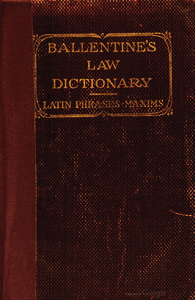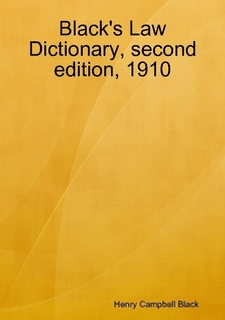The extinction of one's civil rights and capacities.
Definition of Attainder
-
Ballentine's Law Dictionary
-
Black's Law Dictionary: 2nd Edition
That extinction of civil rights and capacities which takes place whenever a person who has committed treason or felony receives sentence of death tor his crime. 1 Steph. Comm. 408; 1 Bish. Cairn. Law, § 641; Green v. Shumway, 39 N. Y. 481; In re Garland, 32 How. Prae. (N. Y.) 251; Cozens v. Long, 3 N. J. Law, 766; State v. Hastings, 37 Neb. 96, 55 N. W. 781. It differs from conviction, in that it is after judgment, whereas conviction is upon the verdict of guilty, but before judgment pronounced, and may be quashed upon some point of law reserved, or judgment may be arrested. The consequences of attainder are forfeiture of grcrperty and corruption of blood. 4 Bl. Comm. At the common law, attainder resulted in three ways, viz.: by confession, by verdict, and by process or outlawry. The first case was where the prisoner pleaded guilty at the bar, or having fled to sanctuary, confessed his guilt and abjured the realm to save his life. The second was where the prisoner pleaded not guilty at the bar, and the jury brought in a verdict against him. The third, when the person accused made his escape and was outlawed.
—Bill of attainder. A legislative act, directed against a designated person, pronouncing him guilty of an alleged crime, (usually treason,) without trial or conviction according to the recognized rules of procedure, and passing sentence of death and attainder upon him. "Bills of attainder," as they are technically called, are such special acts of the legislature as inflict capital punishments upon persons supposed to be guilty of high offenses, such as trCason and felony, without any conviction in the ordinary course of judicial proceedings If an act inflicts a milder degree of punishment than death, it is called a "bili of pains and penalties," but bath are included in the prohibition in the Federal constitution. Story, Const. § 1344; Cummings v. Missouri, 4 Wall. 323, 18 In Ed. 356; Ex parte Garland, 4 Wall. 387, 18 In Ed. 366; People v. Hayes, 140 N. Y. 484, 35 N. E. 951, 23 L. R. A. 830, 37 Am. St. Ren. 572; Green v. Shumway, 39 N. Y. 431; In re Yung Sing Hee (C. C.) 36 Fed. 439.

